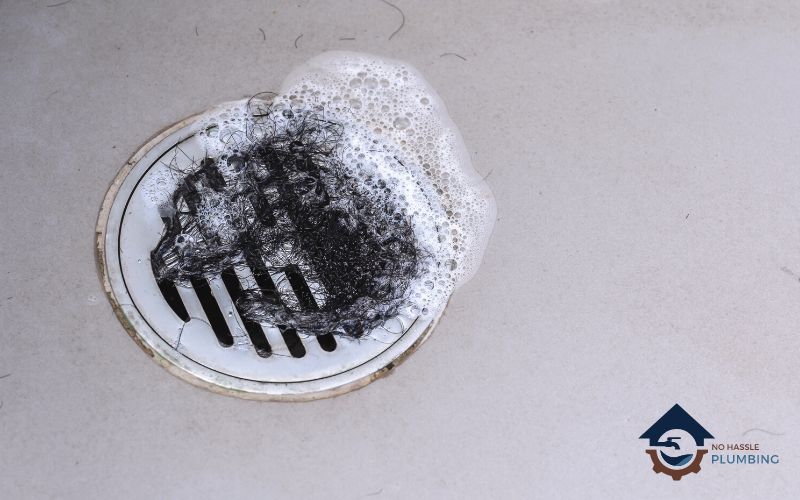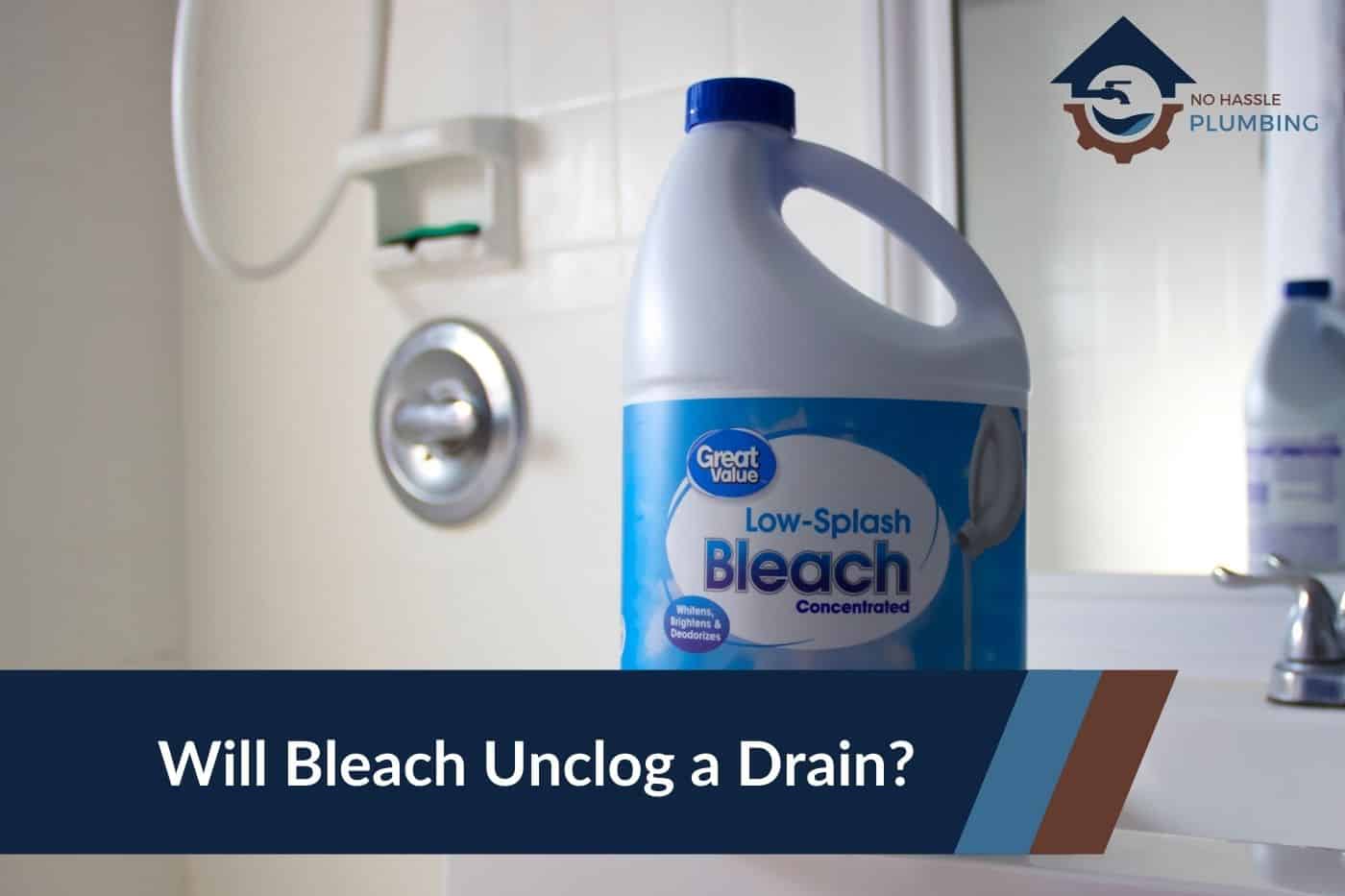Bleach is a common household cleaner and disinfectant, but can bleach unclog drains?
The short answer is no!
While you can use diluted bleach (roughly 1/2 cup bleach to 1-gallon water) to clean and disinfect your kitchen or bathroom sink drains, bleach won’t help to unclog them. Bleach is unable to dissolve, hair, food debris, or oily clogs, which are the three most common causes of clogged pipes.
In addition to being ineffective, it can also be harmful to your plumbing system’s pipes and connections, can wreak havoc on your septic system, and has the potential to be very dangerous to your health if you’re laissez-faire about what you mix it with (hint: don’t mix bleach with anything other than water).
In this article we will discuss what bleach is, how good it is at clearing drains, how to use it to clean and disinfect a drain, why you shouldn’t use bleach to unclog drains, and give five alternatives that are much more effective (and safer) at clearing drains.
Contents
What is Bleach?
Commercially available bleach is a dilute sodium hypochlorite solution (diluted with water). It is commonly used as a disinfectant for killing germs and as a laundry detergent due to its strong oxidizing properties, which allow it to break down organic matter. While there are different types of bleach, chlorine bleach is most commonly used for cleaning purposes.
As an effective disinfectant and cleaner it may appear that it should be an effective drain cleaner, but, can you pour bleach down the drain?
Does Bleach Unclog Drains?
Bleach, although a powerful cleaning agent, cannot be used to clear a clogged drain. When it comes to drain clogs, the main culprits are usually hair, grease, and food debris.
While bleach is effective in breaking down some organic material, it will struggle with larger stubborn food debris, grease, or hair that commonly causes a clog.
| Hair | Grease | Food Debris | |
| Will Bleach Unclog… | No | No | No |
Does Bleach Dissolve Hair?
No, bleach will not dissolve hair. Hair is highly resistant to the dissolving properties of bleach due to its protein structure. The chemical composition of hair makes it resistant to many common cleaning agents including bleach.
Hair clogs in drains typically form when strands of hair combine with soap residue, toothpaste, and other substances to create a blockage. Typically, these types of clogs are best dealt with using a mechanical solution such as a plumber’s snake, coat hanger, or plunger.

Does Bleach Dissolve Grease?
Bleach has limited effectiveness when it comes to dissolving greasy clogs in drains. This is because grease mainly consists of fats and oils, which are not easily broken down by bleach. While it is true that bleach may be able to dissolve small amounts of oily or fatty material, it should not be relied upon as a reliable method for clearing greasy clogs.
For fatty clogs in kitchen sinks or garbage disposal units, a better option is to use a commercial cleaner or a mechanical method such as a drain snake.
Does Bleach Dissolve Food Debris?
Bleach is generally not effective at dissolving food debris in drains. Food particles can form compacted masses that require mechanical methods or specific enzymatic cleaners for proper removal. While using bleach in a clogged drain might temporarily mask the odor caused by food debris, it will not effectively remove the blockage itself.
To effectively remove food debris from drains, a mechanical approach such as plungers, drain snakes, or enzymatic cleaners specifically formulated for breaking down organic matter is recommended.
How to Use Bleach to Clean & Disinfect a Drain?
To clean and disinfect a drain using bleach, follow the step-by-step instructions below.
- Mix a half cup (~120ml) of bleach with a gallon of water (~3.8l). Never pour straight bleach down your drain!
- Pour the diluted bleach into the floor/kitchen/bathroom sink drain.
- Allow the bleach to sit in the drain pipes for about 10 minutes. This duration allows the bleach to effectively work on any organic materials or residue present in the drain.
- Flush the drain with hot water. The warm water will help remove any gunk or solid waste.
Remember to handle bleach with care and follow these safety precautions.
- Wear protective gloves and eye protection when handling bleach to avoid skin and eye irritation.
- Ensure proper ventilation by opening windows or using fans while working with bleach. This will help prevent inhalation of fumes.
- Avoid mixing bleach with other household cleaners, as this can produce toxic fumes such as chloramine or chlorine gas which are deadly.
Why You Shouldn’t Use Bleach as Drain Cleaner
Pouring bleach down your drain is not only ineffective to unclog a drain, but it can also damage your plumbing or septic system, and be harmful to your health.
Bleach can Damage Your Plumbing
Prolonged or excessive use of bleach can potentially damage pipes. Bleach is highly corrosive and certain types of pipes, such as those made of older metal materials or plastic materials like PVC, may be particularly susceptible to damage from regular exposure to bleach. Additionally, bleach can weaken the integrity of rubber seals and gaskets in fixtures, potentially causing leaks.
For those whose home wastewater system feeds into a septic tank, you are best to stay well clear of using bleach in your drains or toilets.
Septic tanks require “good” bacteria to function correctly, by aiding in breaking down the waste material. Unfortunately, bleach is indiscriminate, and will kill this good bacteria in addition to killing any nasty germs.
Bleach can be Harmful
As a powerful disinfectant, direct contact with bleach can cause skin irritations or burns. The strong chemical properties of bleach make it corrosive and potentially harmful to the skin.
Pouring bleach down your drains can lead to unintentional mixing with other chemicals, such as those found in commercial drain cleaners.
Accidentally mixing regular bleach with products containing ammonia or sodium hydroxide (lye) will produce chloramine gas which can lead to burning eyes, and respiratory system problems in addition to severely corroding your plumbing.
Mixing bleach with products with acidic properties such as Sulfuric or hydrochloric acid is a super bad idea. The reaction will create chlorine gas which can cause severe breathing problems and even death. Several common brands of commercial drain cleaner are acidic in nature.
Are there more effective options than Bleach to Clear a Clogged Drain?
If you need to disinfect surfaces, or remove stains then reach for the bleach, but there are several more effective ways to clear clogged drains given in the list below.
- Using Baking Soda and Vinegar
- Using Cola
- Using Boiling Water and Dish soap
- Using a Plumber or Drain Snake
- Using a Chemical Drain Cleaner
1. Using Baking Soda and Vinegar
To clear a drain with baking soda and vinegar – pour one cup of baking soda into the drain, and following with a cup of vinegar. Leave for 15 minutes and then pour hot water to flush the drain pipes.
2. Using Cola
While not the most effective way, it is sometimes possible to remove a drain clog with cola – pour one room-temperature two-liter bottle of Coca-Cola down your drain and leave for an hour. Then run hot water to flush out any debris.
3. Using Boiling Water and Dish soap
The method works particularly well on a greasy clog in your kitchen sink or garbage disposal, to use boiling water and soap – boil two cups of water and add dish soap, then pour the water down the drain. Repeat as necessary.
4. Using a Plumber or Drain Snake
Snaking your drain or toilet is the most effective way to clear a clog – begin by inserting the flexible wire coil into the drain, feeding it deeper down the pipes until you feel resistance. You then rotate the snake to break up and dislodge the clog. Once you have retrieved the snake, pour water down the drain to flush away any remaining debris.
5. Using a Chemical Drain Cleaner
Using a store-bought chemical drain cleaner is one of the easiest and most effective ways to remove stubborn clogs. Just be sure to not mix it with bleach! Drain cleaners + bleach kill!

